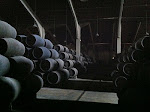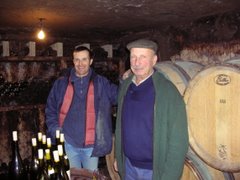Learning Enough to Know That I Don't Know Anything.
"I've learned enough to know how much there is that I don't know." This is an idea that I firmly believe in. When delving deeply into a complex topic one can reach this point that is both exciting and frustrating where one gains new appreciation for the body of experience and knowledge that exists. Regarding wine, I hit this point some time ago. The thing is, years later, many experiences later, I'm still here.
I am reminded of this by several recent experiences where my judgements about wine were entirely different from what I expected based on past experiences. Starkly different. This is what I'm talking about:
The other night after putting kids to bed I made a simple dinner of a pork chop and some vegetables. Burgundy...I hadn't drunk one in a while and I wanted it. But I don't have many bottles that are mature, and I didn't feel like opening a young bottle, or one of the few special older bottles that I own. I decided to open a bottle that isn't important to me, something that I would cull from my cellar. What would that be? I looked at what I have and decided on the 2005 Domaine des Croix Bourgogne, $25, Becky Wasserman Selections. I bought several bottles in early 2008 and loved when it was released, but found subsequent bottles to be too oaky. Look at my notes from Cellar Tracker and you'll see what I mean:
2/9/2008: up there with the very finest Bourgogne i've ever had. wide aromas of red and dark fruits, lots of earth, dark flowers and a mineral core. lovely medium bodied palate echoing the aromas with really persistent flavors on the finish, and a cool minty sensation. just great wine and a Bourgogne, no less. I am seriously tempted to explore the 1er Cru wines by this producer in this vintage.
4/24/2008: on this one, the oak was very powerful from the outset. after 45 minutes or so it calmed down a bit, but hard to evaluate. will check back tonight
2/11/2009: Not ready yet, and probably needs another 3-5 to integrate, if it's going to. The wood is pretty overpowering now. good underlying materials, but hard to discern the nuances of the wine right now. I wonder...will it be able to integrate all of the new oak?
11/2/2010: Oak oak oak oak. and i'm not at all anti-oak. this is not a judicious use, however. perhaps he got excited about the 2005 fruit and threw everything he had at it. in any case, even late on day 2, it's difficult to separate the wine from the vanilla influence of oak, and to see what its personality is. frustrating. Seems like a solid candidate for cellar-culling, no? At least in the sense that it's not a wine that I believe in, as evidenced by my notes. The thing is, the bottle I opened, my last bottle, was really good. Here's my note on that one:
Seems like a solid candidate for cellar-culling, no? At least in the sense that it's not a wine that I believe in, as evidenced by my notes. The thing is, the bottle I opened, my last bottle, was really good. Here's my note on that one:
9/17/2011: a very good bottle, showing the power and depth of the vintage, and also detail of fruit and mineral. there is some oak but it is not intrusive here. There is also a definite sense of place - the wine is made from plots formerly classified as Pommard and Volnay villages, and the wine reminds me of those places. oddly, it doesn't hold up so well on day 2, very curious.
I had several experiences with the wine, and formed several opinions. Which of them is true? You know what - I think they are all true. I was a different taster in early 2008, and the wine changed too. All of these notes reflect one thinking person's real experience with this wine. If someone asked me today to write a review of 2005 Domaine des Croix Bourgogne I would say that it has good qualities, and it has qualities that had concerned me, but a recent bottle was very good. I would say that in the context of regionally classified Burgundy, I was disappointed with this wine for a few years, but a recent bottle was very encouraging.
Would that kind of review satisfy you?
Imagine having to review this wine for a magazine or some sort of publication, having to score it based on one experience in 2008. Or 2009. How can one bottle of a wine, never mind one sip and spit at a tasting, provide sufficient information to assign the wine an absolute rating, a set of tasting notes that readers should accept as truth? If I am the reviewer, it is clear that one bottle is not close to being enough.
A few more recent experiences, just to illustrate how often this sort of thing happens to me:
--I drank a bottle of 2009 Huet Vouvray Sec Clos du Bourg the other night, a bottle that a friend brought to a restaurant. It was great, everything you could want from a young Huet. The only other bottle I drank came from my own cellar a few months ago and was not good. Dan Melia drank it with me and we both thought it was overripe, not focused, and unsatisfying. --I drank a bottle of 2008 Alzinger Riesling Federspiel Dürnsteiner the other night. It was fantastic. I decanted it, as I've learned is very important with basically any Austrian white wine, and left most of it alone for about two hours. Delicate fruit, very mineral, perfect balance, absolutely delicious. The bottle I drank three weeks ago, though, was nowhere near as good. I didn't decant it, and it showed big and ripe and without much detail. Disappointing enough so that only three weeks later I was ready to cull this bottle from my cellar. Turns out that I wasted the first bottle - the wine is excellent if you handle it correctly, which I didn't do the first time.
--I drank a bottle of 2008 Alzinger Riesling Federspiel Dürnsteiner the other night. It was fantastic. I decanted it, as I've learned is very important with basically any Austrian white wine, and left most of it alone for about two hours. Delicate fruit, very mineral, perfect balance, absolutely delicious. The bottle I drank three weeks ago, though, was nowhere near as good. I didn't decant it, and it showed big and ripe and without much detail. Disappointing enough so that only three weeks later I was ready to cull this bottle from my cellar. Turns out that I wasted the first bottle - the wine is excellent if you handle it correctly, which I didn't do the first time. --I drank a bottle of 2006 Michel Gahier Savagnin the other night. A friend brought it to my house for dinner. We liked it, but didn't love it. It was tasty but not complex, constricted, without energy. We re-corked it and moved on to other wines, I stuck it in the door of the fridge and forgot about it. A week later I found it, poured a glass, and it was great! Detailed, expressive, vibrant, completely delicious and intriguing.
--I drank a bottle of 2006 Michel Gahier Savagnin the other night. A friend brought it to my house for dinner. We liked it, but didn't love it. It was tasty but not complex, constricted, without energy. We re-corked it and moved on to other wines, I stuck it in the door of the fridge and forgot about it. A week later I found it, poured a glass, and it was great! Detailed, expressive, vibrant, completely delicious and intriguing.
So what is there to take from all of this?
- Wine changes from bottle to bottle, and within the experience of drinking each bottle. We as tasters change and grow too. It is foolish to assume that one experience with a wine is the defining experience.
- Wine ratings that arise from one tasting probably should not be relied upon, unless the critic is one of the incredibly rare people who actually has the depth and breadth of experience to understand the wine in its current state, and extrapolate from that state something meaningful about the wine as a whole. Those people are out there, but they are few.
- Furthermore, reviews of wine that are based on tasting notes that describe specific flavors such as blackberry, smoke, peach, and things like that, those reviews are completely useless if you care about truly understanding a wine.
- We are going to like some of the wines we drink. And then we will not like those same wines as much when we drink them again, or vice-versa. This will be disappointing and thrilling, and frustrating.







8 comments:
Couldn't agree more.
Yet I find that we still have to remind ourselves of this every so often...
Great piece. We change, and the wine changes. Any notes we take just capture ourselves and the wine at one moment in time.
There is a school of wine criticism that is sadly dying that focused more on the people making the wines, the terroir and the history of the estate. The idea was that if the critic was going to take the time to write all this about a producer, the wines were of enough interest to warrant this treatment. Individual vintages and bottles were less important because the nature of wine is that individyual vintages and bottles are less important. Good producers make interesting (and sometimes excellent) wines in off years, and excellent wine in good years, both both should be worth it. Anybody who buys wine off hype or single vintage scores is missing the picture.
I agree with Brooklynguy and saignee. I recently had a bottle of 2002 Chave St Joseph. 2002 is recognized as a bad vintage, so the wine was a bit cheaper. The wine was killer. Good producers like Chave always make good wine.
Don't forget that bottles actually can be different, bottled at a different time, transport, strorage and very important the containers in which the wine was kept can be and act very different especially when it concerns the ones made from wood. I'd say buy enough of a wine to have the possibility to keep checking in coming years but not so much that you want to hang yourself if it doesn't turn out as you thought it would......
wine can be like a song, can't it? It means different things to you in different moments of your life... :)
I must agree that wine changes it appearance and taste and so as we. Our taste changes together with the variety of wines. So in conducting review one must state the truth that has been taste in one wine.
This post is another example of the humility I admire about your writing and am trying to embody myself. Keep it up. If you don't know anything, I know... whatever is less than that.
Post a Comment